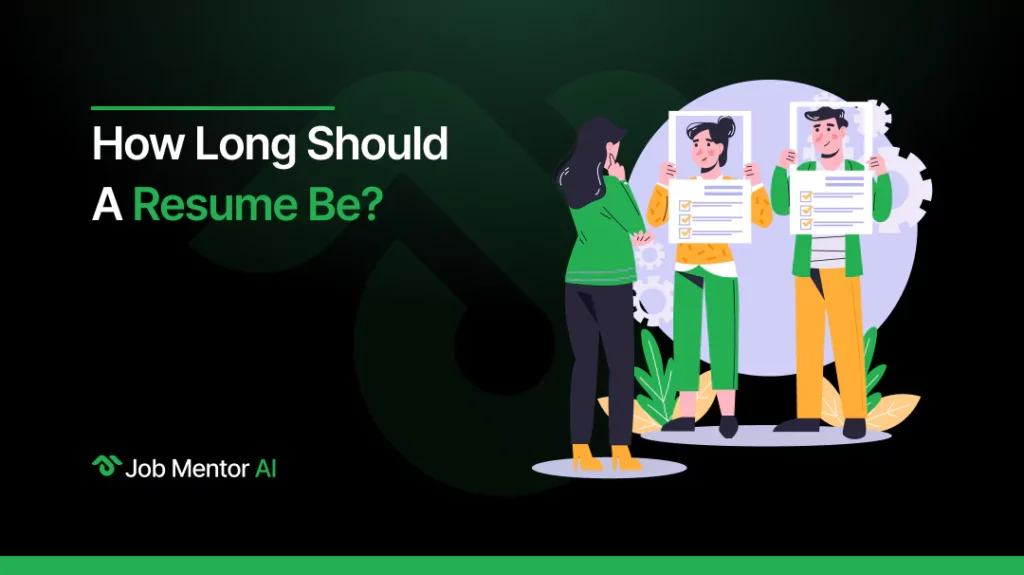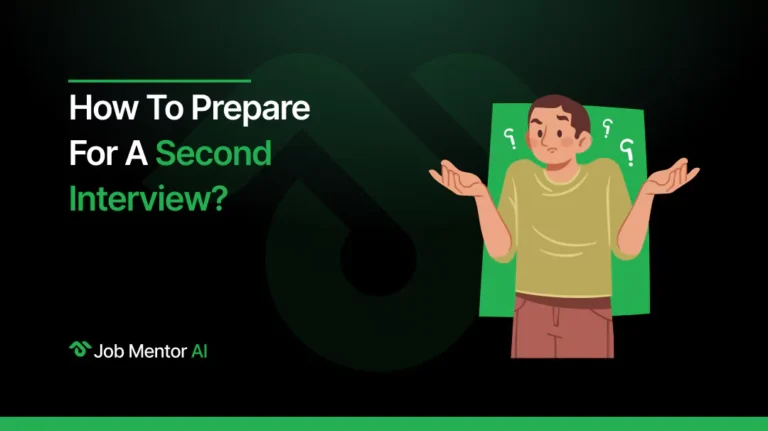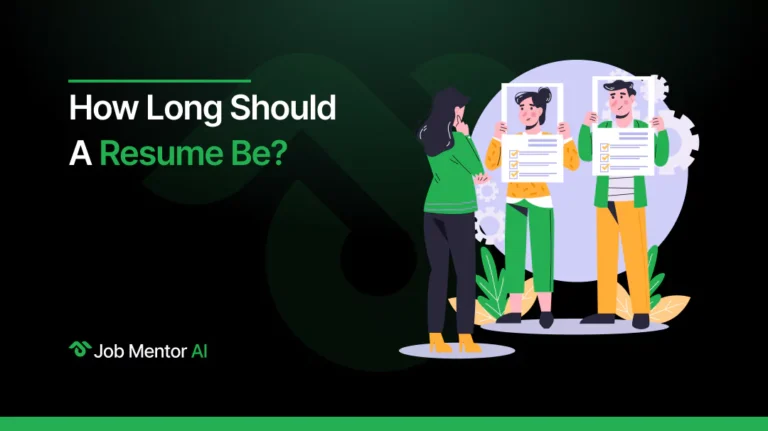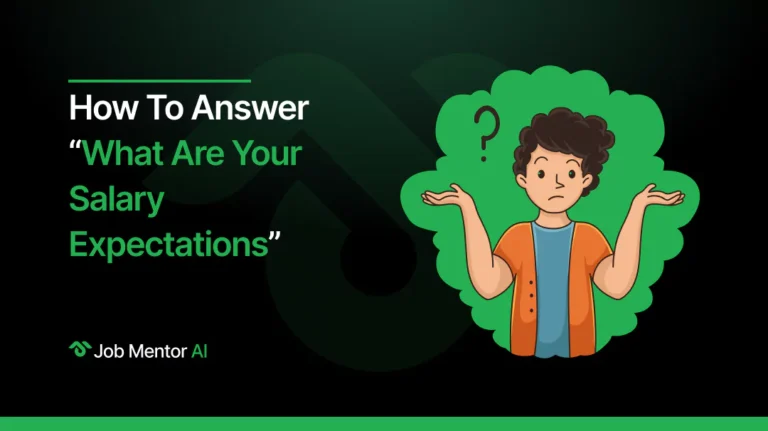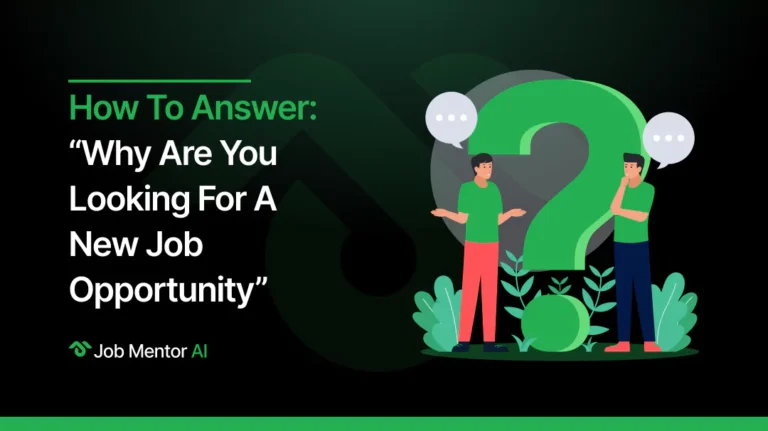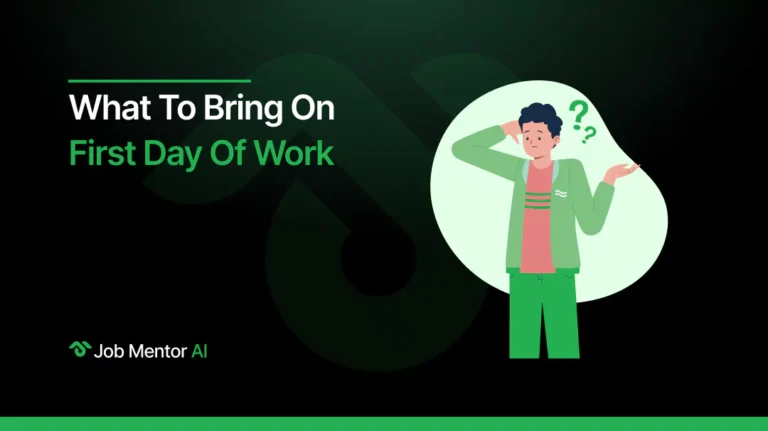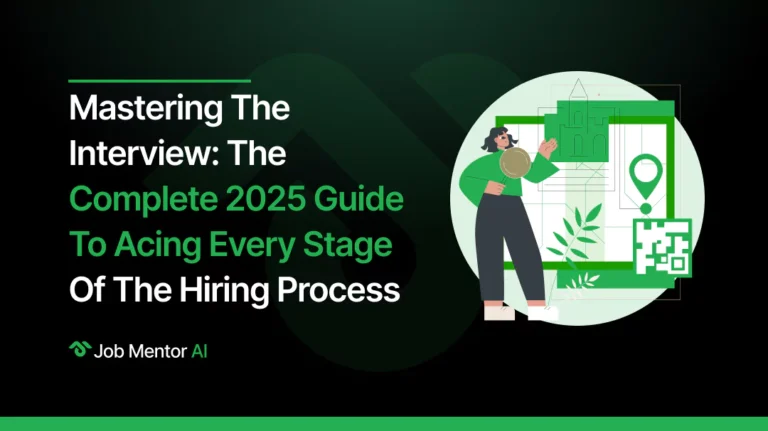One of the most common questions job seekers ask is: how long should a resume be? With hiring managers spending only a few seconds reviewing each application, it’s important to strike the right balance between too much detail and not enough information.
This blog will walk you through everything you need to know about resume length, why it matters, the general rule of thumb, how it changes by career stage, industry expectations, and practical tips to keep your resume concise yet impactful. By the end, you’ll know exactly how many pages a resume should be to impress recruiters and land interviews.
Why Resume Length Matters
Your resume is often the first impression you make on an employer. Since most recruiters only spend a few seconds scanning applications, the right length helps your achievements stand out quickly. Here’s why it matters:
- First impressions count: A resume that’s the right length shows professionalism. Too short can seem incomplete, while too long may look unfocused.
- Relevance matters: Limiting the length forces you to highlight only skills and achievements that fit the role.
- Time is limited: Recruiters spend just 6–10 seconds on the first scan, so a concise resume makes it easier for them to spot your value.
- Clarity over detail: Cutting unnecessary information ensures your key strengths don’t get lost in clutter.
In short, resume length shapes how clearly and effectively your qualifications come across. To make your application even stronger, use an AI Cover Letter Generator to create personalized, professional cover letters quickly and efficiently.
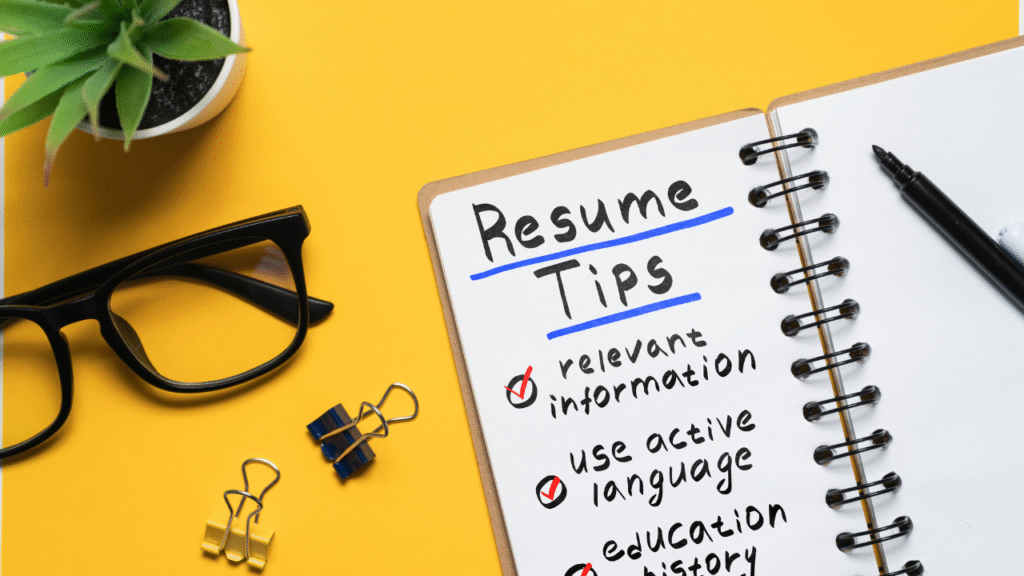
General Rule of Thumb: How Many Pages Should a Resume Be?
When it comes to resume length, there isn’t a single answer that works for everyone. The ideal length depends on your level of experience, career stage, and even the industry you’re applying to. However, the general rule of thumb is that a resume should be one to two pages long.
Let’s break it down:
One Page Resume
- Who it’s for: Fresh graduates, students, entry-level candidates, and professionals with fewer than 7–8 years of experience.
- Why it works: At this stage, you don’t have decades of work history, so keeping your resume to one page ensures you focus on the most important details—your education, internships, key projects, and early achievements.
- Benefits: A one-page resume is concise, easy to read, and shows that you can communicate value efficiently.
Two-Page Resume
- Who it’s for: Mid-level professionals, managers, and those with extensive work experience or multiple roles across industries.
- Why it works: Once you’ve built a career with several jobs, achievements, and skills, one page may not be enough. A two-page format gives you the space to showcase leadership roles, accomplishments, certifications, and measurable results without overcrowding.
- Benefits: It allows you to provide depth while still being structured and easy for recruiters to scan.
More Than Two Pages
- Who it’s for: Rare cases such as academic professionals, researchers, or government employees who need to include detailed publications, projects, and credentials.
- Why it works: Certain fields expect a comprehensive CV (curriculum vitae), not just a resume. These are usually longer and go beyond job history to include scholarly work and contributions.
- Drawbacks: For most industries, anything beyond two pages can be considered excessive and risks losing the recruiter’s attention.
In short, 1–2 pages is considered ideal for the majority of job seekers. The key is to highlight achievements that are relevant to the role you’re targeting while avoiding unnecessary detail.
Once you’ve created the perfect resume, pair it with strong interview preparation. Paying attention to What to Wear for a Job Interview so your professional look complements your resume.
Resume Length by Career Stage
The ideal resume length largely depends on your career stage. As you gain experience, your resume should evolve to reflect your skills, accomplishments, and professional growth. Here’s a detailed breakdown:
1. Entry-Level Candidates
- Length: Stick to one page. Early career candidates don’t have years of work experience, so brevity is key.
- What to include: Focus on education, internships, volunteer experience, part-time jobs, and transferable skills. Highlight coursework or projects that demonstrate relevant abilities.
- Achievements: Emphasize awards, recognitions, leadership roles in student organizations, or any measurable outcomes from internships.
- Tip: Use clear, concise bullet points that showcase your potential and ability to contribute, rather than trying to fill space with unrelated information.
- Example:
Emma Williams
Email: emma.williams@email.com | Phone: (123) 456-7890 | LinkedIn: linkedin.com/in/emmawilliams
Professional Summary
Recent graduate in Marketing with hands-on internship experience in social media campaigns and content creation. Eager to contribute creative ideas and strong organizational skills to a growing marketing team.
Education
B.A. in Marketing | University of Example | 2020–2024
- Dean’s List, 2023
- President, Marketing Club
Internship Experience
Marketing Intern | XYZ Marketing | Jan 2024 – Apr 2024
- Created social media content that increased engagement by 15%.
- Assisted in planning email campaigns reaching 5,000+ subscribers.
Volunteer Experience
Event Coordinator | Local NGO | 2022–2023
- Organized fundraising events raising $2,000 for community programs.
Skills
Social Media Management | Content Creation | Canva | Basic SEO | Email Marketing
2. Mid-Career Professionals
- Length: Typically one to two pages, depending on the breadth of experience and accomplishments.
- What to include: Focus on recent, relevant work experience. Include multiple roles if they demonstrate growth, promotions, or diverse skills.
- Achievements: Showcase measurable results. For example, “Managed a team of 10 and increased department efficiency by 25%” or “Launched a new client program generating $200K in revenue.”
- Tip: Avoid including very early roles or irrelevant positions unless they directly support your current career goals. Keep the resume tailored to the role you’re applying for.
- Example:
Michael Johnson
Email: michael.johnson@email.com | Phone: (123) 456-7890 | LinkedIn: linkedin.com/in/michaeljohnson
Professional Summary
Marketing professional with 7+ years of experience in digital campaigns, team leadership, and client engagement. Proven ability to increase brand visibility, drive revenue, and manage high-performing teams.
Work Experience
Marketing Manager | ABC Corp | 2020–Present
- Managed a team of 10, improving department efficiency by 25%.
- Launched a new client program generating $200K in revenue.
- Developed SEO and content strategy that increased website traffic by 35%.
Marketing Specialist | XYZ Ltd | 2015–2020
- Executed social media campaigns boosting engagement by 30%.
- Collaborated with cross-functional teams to launch 10+ product campaigns.
Education
B.A. in Marketing | University of Example | 2010–2014
Skills
Digital Marketing | SEO | Content Strategy | Team Leadership | Analytics
Certifications
Google Analytics Certified | HubSpot Content Marketing Certification
3. Senior Executives & Specialists
- Length: Two full pages is generally acceptable, occasionally slightly longer if absolutely necessary for technical or specialized roles.
- What to include: Highlight leadership experience, strategic initiatives, major projects, and technical expertise. Include certifications, speaking engagements, or publications if relevant.
- Achievements: Focus on results and impact. Quantify successes wherever possible, such as revenue growth, cost savings, or operational improvements.
- Tip: Maintain clarity and avoid overwhelming detail. Even at a senior level, hiring managers prefer concise summaries that demonstrate measurable impact.
- Example:
Sarah Thompson
Email: sarah.thompson@email.com | Phone: (123) 456-7890 | LinkedIn: linkedin.com/in/sarahthompson
Professional Summary
Senior operations director with 15+ years leading strategic initiatives, optimizing processes, and managing large teams. Expert in operations management, revenue growth, and organizational development.
Work Experience
Director of Operations | GHI Inc. | 2018–Present
- Streamlined supply chain operations, reducing costs by 18% and increasing productivity by 30%.
- Oversaw 5 cross-functional teams, delivering projects 20% ahead of schedule.
- Implemented performance metrics improving department efficiency and accountability.
Senior Consultant | JKL Group | 2012–2018
- Led $5M+ projects ensuring timely delivery and client satisfaction.
- Developed strategic frameworks adopted across multiple departments.
- Mentored 20+ junior consultants on project management and client relations.
Education
MBA in Operations | University of Example | 2010–2012
B.S. in Industrial Engineering | University of Example | 2006–2010
Skills
Operations Management | Strategic Planning | Process Optimization | Leadership | Budgeting | Change Management
Certifications & Achievements
PMP Certified | Lean Six Sigma Black Belt | Keynote Speaker at Industry Conferences
While working on your resume, it’s equally important to prepare for interviews. Understanding how to impress a hiring manager by demonstrating the traits and tactics that employers value most can significantly increase your chances of moving forward in the hiring process.

Industry Expectations for Resume Length
Different industries have varying expectations when it comes to resume length. Knowing these standards can help you tailor your application to meet recruiter expectations and improve your chances of landing an interview.
- Creative industries (design, media, marketing): Shorter, visually appealing one-page resumes are often preferred. Emphasis is on showcasing your portfolio, creativity, and design skills rather than a long list of past roles.
- Corporate and business roles: Typically expect 1–2 pages that highlight measurable achievements, leadership experience, and strategic contributions. Employers look for results-oriented summaries that demonstrate your impact on the organization.
- Academic, research, or government roles: Longer CVs (3+ pages) are standard to include detailed publications, projects, research experience, and professional credentials. Clarity and organization are critical here to ensure readers can navigate the document easily.
- Tech and IT roles: These often favor concise resumes with detailed technical skills. Including key programming languages, certifications, and project experience helps recruiters quickly assess your suitability for specialized roles.
- Healthcare and specialized professions: Resumes in fields like medicine, engineering, or law often require a balance between brevity and detail. Relevant certifications, clinical experience, and specialized training should be clearly highlighted without overwhelming the reader.
Understanding industry standards helps you align your application with recruiter expectations. You should understand how to master the interview to ensure your resume strategy is fully reinforced during the hiring process.
Tips to Keep Your Resume the Right Length
Keeping your resume the right length is about balancing completeness with clarity. Here are proven strategies to make your resume concise, impactful, and recruiter-friendly:
- You should focus on roles, skills, and achievements that directly relate to the job you’re applying for, removing outdated or unrelated positions.
- You should organize your experience in clear, digestible bullet points so recruiters can quickly identify your accomplishments.
- You should emphasize measurable results instead of simply listing duties, such as “Increased sales by 20% in one year” rather than “Managed sales team.”
- You should remove hobbies, long addresses, and unrelated coursework so that every line supports your professional story.
- You should start sentences with strong action verbs like “led,” “created,” “developed,” and “achieved” to clearly demonstrate impact.
- You should keep margins clean, fonts professional, and spacing consistent to make your resume easier to read without adding extra pages.
- You should customize your resume for every role by highlighting experiences and skills that align with the employer’s needs.
After an interview, sending a concise and professional note can leave a lasting impression, and you should write a thank-you email after an interview to reinforce your qualifications
Conclusion
The ideal resume length depends on your career stage, industry, and relevant experience. Most candidates should aim for one to two pages, which answers the common question of how long should a CV be, while highlighting key achievements and skills. A clear, focused, and well-structured resume helps recruiters quickly see your value. Combining it with professional interview preparation and thoughtful follow-up increases your chances of landing the job.
To enhance your preparation, try an AI Interview Assistant that allows you to refine your answers, improve your delivery, and build genuine confidence before the interview.
Leverage AI Interview Intelligence for fast, practical feedback that accelerates your progress and helps you approach interviews feeling focused, confident, and persuasive.
Table of Contents
Frequently Asked Questions
Is 2 pages too long for a resume?
No, a two-page resume is suitable for mid-level or senior professionals with relevant experience and accomplishments.
Is it okay to have a 3-page resume?
A three-page resume is generally too long for most industries and may overwhelm recruiters. Only consider it for specialized roles requiring extensive documentation.
What is the ideal length of a resume?
Most resumes should be one to two pages, focusing on relevant achievements and skills.
What is the 30-second rule for a resume?
Recruiters often spend about 30 seconds on the first glance, so your key skills and accomplishments should be immediately visible.
What is the difference between a resume and a cover letter?
When considering a resume vs. cover letter, remember that a resume highlights your skills, experience, and achievements, while a cover letter explains why you are the right fit for the job.
Can a short resume hurt my chances?
If it’s too brief and misses key achievements, a short resume may not fully showcase your qualifications.
What are the common resume mistakes?
Common mistakes include cluttered formatting, including irrelevant information, and failing to highlight measurable results.
What makes a resume look cluttered?
Too many fonts, dense text, long paragraphs, or unrelated details can make a resume difficult to read.

